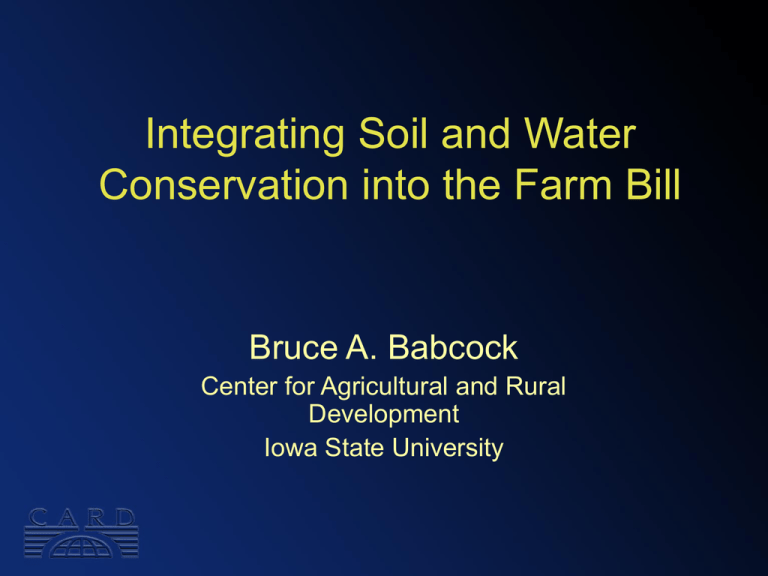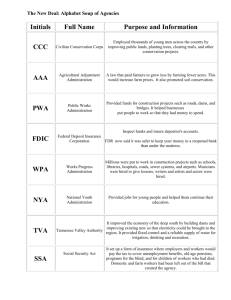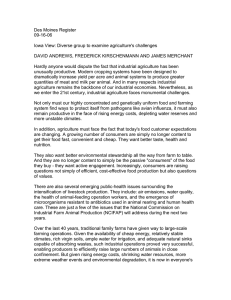Integrating Soil and Water Conservation into the Farm Bill Bruce A. Babcock
advertisement

Integrating Soil and Water Conservation into the Farm Bill Bruce A. Babcock Center for Agricultural and Rural Development Iowa State University The Farm Bill Title I – Commodity programs Title II – Conservation Title III – Trade Title IV – Nutrition Title V – Credit Title VI – Rural Development Title VII – Research Title VIII – Forestry Title IX – Energy Title X - Miscellaneous Relative Importance of Farming to U.S. Society and Economy 30% 25% 20% 15% 10% 5% 0% 1920 1930 1940 1950 1960 Agriculture's Share of GDP 1970 1980 1990 2000 Farm Population (Share of U.S.) 2010 Why Do U.S. Farm Subsidies Persist? • No “public good” purpose to farm programs: Most studies show that aggregate U.S. production would not much change with program elimination. The most wealthy farmers and land owners receive the largest proportion of aid so no efficient poverty elimination Food security a function of income, not food quantity Farm programs do little to foster rural development Growth in Per-Capita County Incomes 1990 to 2001 States.shp Counties.shp Negative Growth 0 to 20% 20% to 40% 40% to 60% 60% to 100% Percent of County Income from Farming States.shp Counties.shp 0% to 5% 5% to 12% 12% to 23% 23% to 40% > 40% Relationship Between Dependence on Farm Income in 1990 and Per-Capita Income Growth 1990 to 2001 for Midwestern States Income Growth 1990 to 2001 150% 100% 50% 0% 0% 10% 20% 30% 40% 50% -50% -100% Percent of County Income from Farming 60% 70% My conclusion about persistence • Who wrote 2002 Farm Bill? – Larry Combest and Tom Harkin (with a lot of help from Tom Daschle). Cotton and rice; corn and soybeans, and wheat. • Which U.S. crops are the least competitive? – Cotton, rice, sugar. Political deal: Corn Belt and Great Plains senators will keep foreign competition away from the Southern commodities sugar cane, cotton and rice, in exchange for large subsidies to corn, soybeans, and wheat. Sugar beets in a few states garners a few key votes. Classic logrolling with historical momentum. Private Benefits of Conservation-Title Programs • Productivity benefits – Reduce soil erosion rates – Enhance productivity of fertilizer/pesticide applications • Farmer incomes – EQIP funds to help livestock producers pay for improved manure management – Restrictions on ability to concentrate funds geographically Possible Public Benefits of ConservationTitle Programs • Enhanced water quality – Better drinking water – Improved swimming/fishing opportunities • Enhanced wildlife – Birds and mammals to look at and hear – Other birds and mammals to shoot • Faster income growth in rural areas? New European Ag Policy • Farmers that agree to manage their farms “correctly” qualify for a direct payment – Environment – Animal welfare – Hygiene standards – Preservation of the countryside Countryside Preservation • EU Philosophy: A rural area that is pleasant to visit will attract more visitors. • EU is beginning a move to use rural areas to both produce food and to produce tourism services. • Farmers are used to manage their farms to make rural areas more attractive places to visit. Applicability to Iowa? • What does rural Iowa have to attract visitors? – Hunters, bird watchers, large rivers, prairie, Loess Hills • • • • No natural tourist links to food industry Large commodity farms not conducive to visitors Poor water quality not conducive to tourism Indirect links to tourists – cleaner water may enhance tourist use of waters – Less farmed land may enhance wildlife and prairie EU model not directly applicable to Iowa Benefits of Farm-Bill Conservation Programs • Private – Higher on-farm productivity – Higher farm income • Public – Cleaner water – Enhanced wildlife habitat Why Focus on Private vs. Public Benefits? • Private benefits drive politics, which ultimately determines policies • Public benefits justify taxpayer support – Public benefits, by definition, are underprovided by the private sector because private enterprise cannot earn profits by their provision – Private benefits can be paid for by the private sector Conservation vs. Commodity Programs: Which Will Win in Next Farm Bill? • Hypothesis: A more urban Congress will eliminate commodity payments in favor of conservation programs. 53 Districts Conservation vs. Commodity Programs: Which Will Win in Next Farm Bill? • Myth: A more urban Congress will eliminate commodity payments in favor of conservation programs. – What stake does an L.A. County resident have in Iowa conservation? – What was the first thing cut when Congress needed to pay for farm disaster spending in 2004? • Conservation Security Program Key to Enhancing Conservation in the Next Farm Bill • Continue to link public benefits of conservation to private benefits – More efficient nutrient and pesticide use will lead to improved waster quality – CRP, WRP, GRP rental income enhances water and wildlife • Insist on greater conservation compliance as only public benefit from commodity programs




